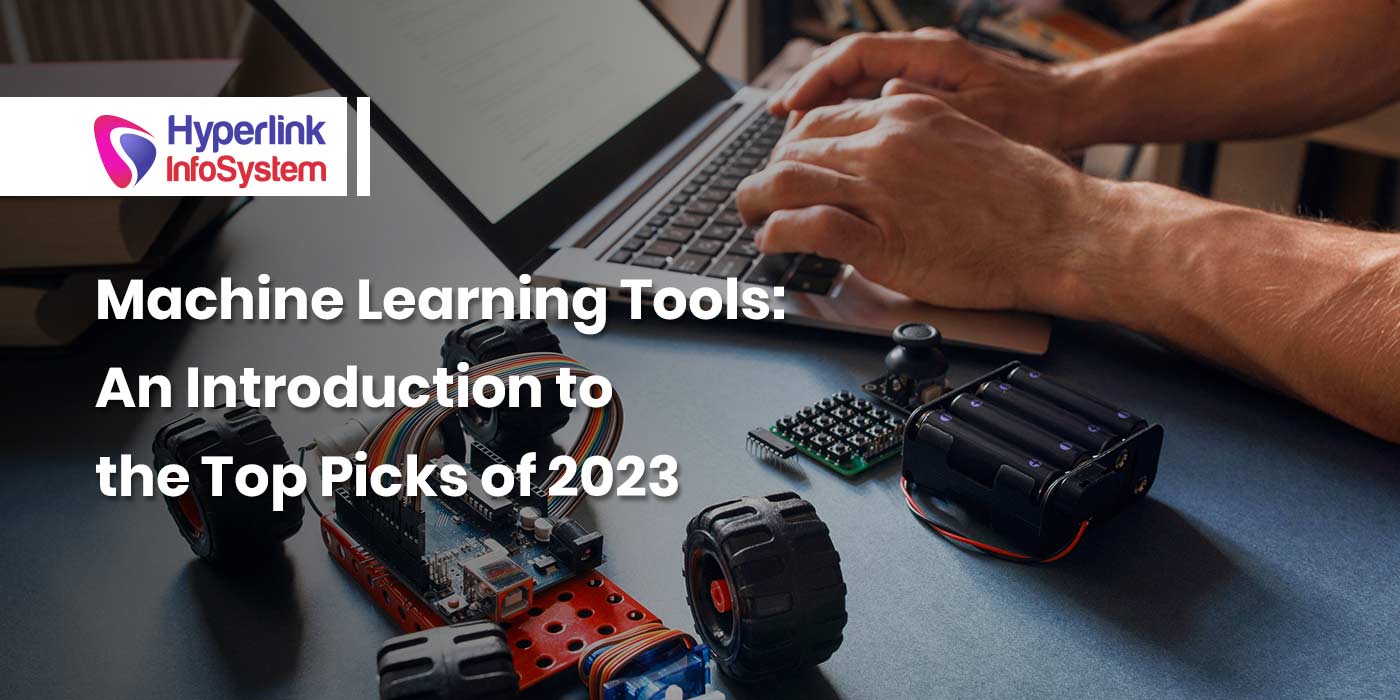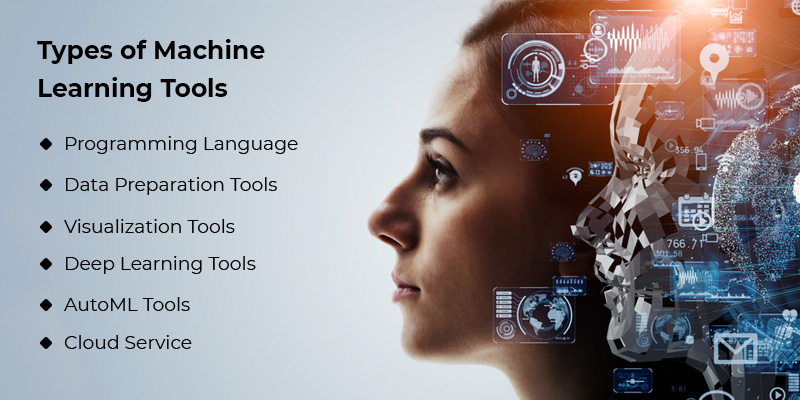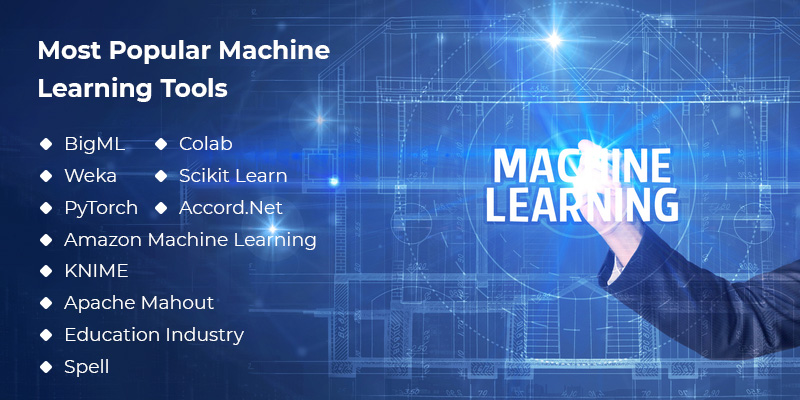In today's data-driven business world, companies are increasingly turning to machine learning as a powerful tool to analyze vast amounts of data and gain insights into their customers' needs and behavior. By leveraging machine learning algorithms, companies can build models that learn and improve on their own without the need for human intervention. As the amount of data continues to grow, the use of machine learning has become essential for companies to stay competitive. Consequently, there is a growing interest in exploring various machine learning tools and techniques to harness the power of AI and gain a competitive edge.
This article will explore the latest Machine Learning tools available up to 2025.
What is Machine Learning?
Machine Learning is a subfield of artificial intelligence (AI) that involves the use of algorithms and statistical models to enable computers to learn from data and make decisions or predictions without being explicitly programmed.
The process of using algorithms and statistical models to analyze data patterns and draw conclusions is known as machine learning. In essence, the machine is trained to learn independently by being presented with numerous examples. These examples are used to help the machine develop its ability to make predictions and classifications.
Machine Learning has the potential to revolutionize many industries and improve the way we live and work. As more and more data becomes available, and as algorithms become more sophisticated, we can expect to see even greater advancements in the field of Machine Learning in the years to come.
If you think machine learning tools can be just one type, you might need to take a list of machine learning tool types we have mentioned over here. Let’s start with the basic ones.
Programming languages are the foundation of machine learning. There are several programming languages available for machine learning, including Python, R, Java, C++, and MATLAB.
Python is the most popular language for machine learning due to its simplicity and a large number of libraries available for data manipulation and analysis.
Data preparation is a critical step in machine learning. Data preparation tools help to clean, transform, and preprocess data before it is fed into machine learning models. Some popular data preparation tools include Excel, OpenRefine, KNIME, and RapidMiner.
Visualization tools help to display data in a graphical format, making it easier to identify patterns and relationships in the data. Some popular visualization tools for machine learning include Tableau, Power BI, ggplot, and Matplotlib.
Deep learning is a subfield of machine learning that involves the use of neural networks with many layers. Deep learning tools are specialized libraries and frameworks that enable the development of complex neural networks. Some popular deep learning tools include TensorFlow, Keras, PyTorch, and Caffe.
AutoML (Automated Machine Learning) tools are designed to automate the process of building and selecting machine learning models. AutoML tools perform tasks such as data preprocessing, feature engineering, model selection, and hyperparameter tuning automatically. Some popular AutoML tools include H2O.ai, DataRobot, and Google Cloud AutoML.
Cloud services provide a platform for machine learning applications and make it easier to manage and scale machine learning workflows. Cloud service providers offer a range of services, including computing resources, storage, data analytics, and machine learning tools. Some popular cloud service providers for machine learning include
Amazon Web Services, Google Cloud Platform, and Microsoft Azure.
The above-listed types of machine learning tools are essential for building and deploying machine learning applications. Depending on the specific requirements of a project, one or more of these tools can be used to achieve the desired outcome.
Choosing the best machine learning tools depends on several factors such as the problem you are trying to solve, the size and complexity of your dataset, your level of expertise, and the computing resources available to you. Here are some key considerations to help you choose the right machine learning tools for your project:
You can not get started with anything, right? So first and foremost step is to find and define the problems you are facing that Machine learning tools can solve. As different machine learning tools are better suited for different types of problems such as classification, regression, clustering, etc. Make sure to choose a tool that is designed to address your specific problem.
The size and complexity of your dataset can also impact your choice of machine learning tools. For example, some tools are better suited for handling large datasets or datasets with a high number of features.
Consider your level of expertise in machine learning. Some tools are more user-friendly and require less programming knowledge, while others require more advanced skills.
-
Consider Computing Resources
Machine learning tools can be computationally intensive, so it's important to consider the computing resources available to you. Some tools require high-end hardware to run efficiently.
-
Research Available Options
There are a variety of machine learning tools available, both open-source and commercial. Do your research and compare different tools to determine which one is the best fit for your project.
Many machine learning tools offer free trials or demo versions. Take advantage of these opportunities to try out different tools and see how they perform on your dataset before committing to a particular tool.
-
Consider Community Support
Look for machine learning tools that have an active community of users and developers. This can be valuable for troubleshooting and getting help with any issues that may arise.
Ultimately, choosing the best machine learning tool requires careful consideration of your specific needs and resources. By taking the time to evaluate your options, you can ensure that you choose a tool that will help you achieve your machine-learning goals.
As you have all the details to choose the right Machine learning tools. This is the time we take a look at the most popular and most suited machine learning tools that can not only solve your issues but can also help you enhance the system.
1. BigML
The tool that ranks first in our list of most popular Machine learning tools is BigML. BigML is a cloud-based machine learning tool that allows users to create and deploy machine learning models easily and efficiently. BigML offers a user-friendly interface that allows users to build predictive models without the need for extensive coding or programming knowledge.
The tool provides a range of machine-learning algorithms that can be applied to various types of data, including structured and unstructured data. It also includes automatic feature engineering, which simplifies the process of feature selection by automatically generating new features based on the data.
BigML has a built-in data visualization tool that enables users to explore their data visually and identify patterns and trends. This tool makes it easy for users to analyze their data and identify key variables that impact their predictive models.
BigML also has a REST API that allows users to integrate the tool with their existing applications, making it easy to deploy and scale machine learning models. The tool is cloud-based, which means that users can access it from anywhere with an internet connection, making it a convenient option for teams that work remotely.
2. Weka
Weka is a popular and widely-used open-source machine learning tool that is used for data mining and predictive analytics. It was developed by the Machine Learning Group at the University of Waikato in New Zealand and is available under the GNU General Public License.
The tool is written in Java and can be run on any platform that supports Java. Weka provides a number of useful features including the ability to visualize datasets, create models, and evaluate the performance of models. It also provides a number of tools for data preprocessing such as normalization, discretization, and feature scaling.
One of the major strengths of Weka is its large library of machine-learning algorithms. It includes popular algorithms such as decision trees, Naive Bayes, k-nearest neighbor, support vector machines, and neural networks. These algorithms can be used for a variety of tasks, such as predicting customer churn, identifying fraud, or diagnosing diseases.
3. PyTorch
PyTorch is widely used by researchers, developers, and data scientists to build and train deep neural networks. It is a popular choice due to its ease of use, flexibility, and scalability. PyTorch is built on top of the Torch library, which is written in C++ and provides a fast and efficient backend for running computations on GPUs.
PyTorch has gained popularity in recent years due to its dynamic computational graph, which allows users to modify their models on the fly and perform arbitrary operations during training. This is in contrast to other popular deep learning frameworks, such as TensorFlow, which uses static computational graphs.
The vital feature of PyTorch is its ability to provide automatic differentiation, which enables the calculation of gradients for all operations in the network. This allows users to train their models using gradient-based optimization algorithms such as stochastic gradient descent (SGD) or Adam.
Another advantage of PyTorch is its support for dynamic batching and dynamic computation graphs, which allow users to build models that can handle variable-length sequences, such as text or speech data. PyTorch also provides a rich set of pre-built modules, such as convolutional layers, recurrent layers, and activation functions, which can be easily combined to build complex models.
4. Amazon Machine Learning
Amazon ML uses supervised learning algorithms to build predictive models from data. These models can be used for a variety of tasks, such as forecasting customer behavior, predicting product demand, detecting fraud, and more. The service supports three types of models: binary classification, multiclass classification, and regression.
To build a model with Amazon ML, users need to provide their data in CSV format or connect to their data sources through Amazon S3, Amazon Redshift, or Amazon RDS. The tool then automatically pre-processes the data, including feature engineering and handling missing values. Users can choose from a range of algorithms, including linear regression, logistic regression, and decision trees, or allow Amazon ML to select the best algorithm for their data.
Once the model is trained, users can evaluate its performance using metrics such as precision, recall, and accuracy. They can also generate predictions by invoking the model through an API or integrating it into their applications using AWS Lambda. Amazon ML also provides tools for monitoring the model's performance and retraining it as new data becomes available.
5. KNIME
KNIME is a powerful and user-friendly open-source machine learning tool that provides a platform for data exploration, preprocessing, analysis, and modeling. KNIME, which stands for "Konstanz Information Miner," was initially developed at the University of Konstanz in Germany and is now used by a growing community of data scientists and analysts worldwide.
The KNIME platform allows users to build, execute, and visualize workflows that integrate various data sources and processing steps. These workflows can be constructed using a drag-and-drop interface, which makes it easy to design complex data pipelines without the need for coding. KNIME supports a wide range of data formats, including spreadsheets, databases, and Hadoop Distributed File Systems (HDFS).
The key strength of KNIME is its extensive collection of machine learning and data mining algorithms, which are implemented as modular "nodes" that can be easily incorporated into workflows. These nodes cover a broad range of techniques, including classification, regression, clustering, dimensionality reduction, and more. Users can experiment with different algorithms and configurations to find the best approach for their specific problem.
6. Apache Mahout
Apache Mahout is an open-source machine-learning library that provides scalable and distributed algorithms for data mining, clustering, classification, and collaborative filtering. It was developed by the Apache Software Foundation and written in Java. The library is designed to work on top of Apache Hadoop, which allows it to handle large datasets in a distributed computing environment.
Apache Mahout includes a wide range of algorithms, including supervised and unsupervised learning methods, such as k-means clustering, decision trees, and naive Bayes classifiers. These algorithms can be used for a variety of tasks, including recommender systems, image classification, and natural language processing.
The library can handle large datasets by distributing the computation across multiple nodes in a Hadoop cluster, making it a suitable tool for big data applications. Mahout also includes a number of tools for data preprocessing and feature extraction, which can help to improve the accuracy of machine learning models.
7. Spell
A spell machine learning tool is a type of software application that uses machine learning algorithms to automatically detect and correct spelling errors in written text. These tools are becoming increasingly popular due to their ability to improve the accuracy and efficiency of written communication, particularly in settings where written content needs to be error-free and professional, such as in business correspondence, academic writing, or publishing.
There are several advantages to using a spell machine-learning tool. For one, it can save time and effort by automatically detecting and correcting errors that would otherwise need to be identified and corrected manually. This can be especially helpful for non-native speakers of a language or individuals with dyslexia or other learning disabilities that make spelling a challenge. Additionally, by learning from user feedback, a spell machine learning tool can become more accurate and customized to individual user needs, improving its effectiveness over time.
8. Colab
Colab is a cloud-based machine learning tool that provides users with free access to a Python programming environment and a suite of pre-installed machine learning libraries. Colab is hosted on Google Drive, and users can access it through their web browser. The tool allows users to write and execute Python code, store and share code notebooks, and run machine learning models in the cloud.
One of the most significant benefits of using Colab is that it is entirely free, making it an accessible and valuable resource for both students and professionals. Colab also offers a powerful GPU, which is ideal for running computationally intensive machine-learning algorithms. Users can access this GPU without having to purchase or install any hardware, making Colab a cost-effective and efficient solution for developing and testing machine learning models.
9. Scikit Learn
Scikit-learn is an open-source machine learning library for Python programming language. It is one of the most widely used and popular libraries for machine learning in Python due to its simplicity, efficiency, and flexibility. Scikit-learn provides a wide range of machine learning algorithms and tools for data preprocessing, feature extraction, model selection, and evaluation.
Scikit-learn supports supervised and unsupervised learning algorithms for classification, regression, clustering, dimensionality reduction, and model selection. Some of the commonly used supervised learning algorithms in scikit-learn are Linear Regression, Logistic Regression, Decision Trees, Random Forest, Support Vector Machines (SVMs), and Neural Networks. Scikit-learn also provides a variety of unsupervised learning algorithms such as K-means clustering, Principal Component Analysis (PCA), and t-distributed Stochastic Neighbor Embedding (t-SNE).
Scikit-learn's API is consistent and intuitive, making it easy for developers to use and learn. It provides a wide range of data preprocessing and feature extraction techniques such as normalization, scaling, and dimensionality reduction.
10. Accord.Net
Last but not least, Accord.NET is a powerful and flexible machine-learning framework that provides a rich set of tools and algorithms for building and deploying machine-learning models. Its focus on performance, scalability, and ease of use makes it a popular choice among .NET developers for a wide range of applications.
One of the core features of Accord.NET is its support for a wide range of machine-learning algorithms. The framework includes implementations of popular supervised learning algorithms such as decision trees, support vector machines, and neural networks, as well as unsupervised learning algorithms such as clustering and principal component analysis. Additionally, Accord.NET provides tools for data preprocessing, feature selection, and model evaluation, making it a comprehensive tool for building and deploying machine learning models.
Another strength of Accord.NET is its focus on performance and scalability. The framework is optimized for multi-core CPUs and can leverage GPUs for even faster processing of large datasets. Additionally, Accord.NET supports distributed computing through its integration with Apache Spark, enabling developers to scale their machine-learning applications to handle big data.
Even though we have listed the top 10 most popular Machine learning tools there is various other Machine learning tool that exists out there. And our AI developers are proficient in almost every one of them. You can Hire AI developers from Hyperlink InfoSystem to leverage their extensive expertise and experience in Machine learning. Our developers can help you figure out the development requirements and own a feature-rich solution to leverage all the benefits machine learning tools has to offer.
Along with offering specific enhancements and benefits to your solutions,
machine learning development offers various other generalized benefits. Being one of the powerful tools that are rapidly transforming many industries, ML tools have revolutionized how data is analyzed and processed, making it easier for businesses and organizations to make informed decisions. Here are some of the advantages of using machine learning tools:
-
One of the main advantages of machine learning tools is that they can analyze vast amounts of data much faster than humans. This leads to more accurate and precise results. ML algorithms can identify patterns and trends in data that are not easily observable by humans, enabling businesses to make more informed decisions.
-
By automating repetitive and time-consuming tasks, ML tools can significantly increase efficiency. For example, ML algorithms can analyze customer data to determine which products are likely to sell the most, or they can be used to predict which customers are most likely to churn, allowing businesses to take proactive measures to retain those customers.
-
ML tools can be used to analyze customer behavior and preferences, allowing businesses to create personalized marketing campaigns and offers. This can lead to increased customer satisfaction and loyalty, as well as higher sales.
-
ML tools can help businesses reduce costs by automating tasks that would otherwise require human labor. For example, ML algorithms can be used to automate customer service, reducing the need for human customer service representatives.
-
ML tools can handle large amounts of data and can be easily scaled up or down to meet changing business needs. This makes them ideal for businesses that experience fluctuations in demand or need to process large amounts of data quickly.
-
By providing insights into data that would otherwise be difficult to obtain, ML tools enable businesses to make better decisions. For example, ML algorithms can be used to identify fraudulent transactions, enabling businesses to take immediate action to prevent losses.
-
ML tools can provide businesses with a competitive advantage by enabling them to make better decisions, create more personalized experiences for customers, and reduce costs. This can lead to increased market share and profitability.
ML tools offer many advantages to businesses and organizations, including improved accuracy, efficiency, personalization, cost savings, scalability, better decision-making, and competitive advantage. As a result, the use of ML tools is becoming increasingly common across many industries.
Usage of Machine Learning in Different Industries
Machine learning (ML) is a rapidly growing field that is finding its way into a wide range of industries. Here are some examples of how machine learning is being used in different industries:
Machine learning in healthcare is being used to improve medical diagnosis and treatment. For example, ML algorithms are being developed to detect early signs of diseases such as cancer and Alzheimer's. It is also used to improve medical imaging and to predict the outcome of medical procedures.
Whether it could be optimizing the data privacy of the users or transactions or enhancement of fraud detection, risk assessment, trading algorithms, or anything else, various finance institutes use different machine learning tools. It helps them to analyze vast amounts of data to identify patterns and anomalies that humans may miss.
Enhancement of the customer experience to analyzing the customer data; machine learning tools can do it all. Different machine learning tools help the retail industry to offer personalized user experiences offering customer-specific product suggestions. Along with this, the expertise of AI and ML development can help you to optimize pricing strategies and inventory management, improve production efficiency, reduce defects, and optimize supply chain management. It can also be used for predictive maintenance to reduce downtime and increase equipment lifespan.
Machine learning is being used to optimize route planning, reduce fuel consumption, and improve safety. It is also used for the predictive maintenance of vehicles and equipment.
Educational institutions, colleges, and universities are using different Machine learning tools to improve learning outcomes by analyzing student data to provide personalized learning experiences. It can also be used to identify at-risk students and to optimize educational resources.
Machine learning is being used to analyze customer data to create targeted marketing campaigns. It can also be used for sentiment analysis to monitor brand reputation and customer feedback. Machine learning has the potential to revolutionize many industries by providing insights that were previously impossible to obtain. As technology advances, we can expect to see even more innovative applications of machine learning in a wide range of industries.
Conclusion
Over the past decade, there has been a surge in the demand for Machine Learning solutions across different fields, leading to the
rise of various Machine Learning platforms and tools. These top ten Machine Learning tools offer a diverse range of features, algorithms, and libraries to support the development and implementation of accurate machine learning models. With the continuous evolution of the Machine Learning field, we can expect further advancements and enhancements in these tools, empowering data scientists, researchers, and developers with more potent capabilities. If you are looking for a reliable
AI development company, Hyperlink InfoSystem is one of the most reliable company to connect with.

























